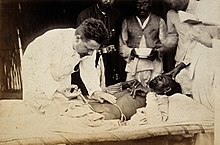Plague vaccine
 Plague vaccine being administered | |
| Vaccine description | |
|---|---|
| Target | Yersinia pestis |
| Vaccine type | Attenuated |
| Clinical data | |
| AHFS/Drugs.com | Micromedex Detailed Consumer Information |
| ATC code | |
| Identifiers | |
| ChemSpider |
|
| UNII | |
| | |
Plague vaccine is a vaccine used against Yersinia pestis to prevent the plague.[1] Inactivated bacterial vaccines have been used since 1890 but are less effective against the pneumonic plague, so live, attenuated vaccines and recombinant protein vaccines have been developed to prevent the disease.[2]
Plague immunization
[edit]The first plague vaccine was developed by bacteriologist Waldemar Haffkine in 1897.[3][4] He tested the vaccine on himself to prove that the vaccine was safe.[4][5] Later, Haffkine conducted a massive inoculation program in British India, and it is estimated that 26 million doses of Haffkine's anti-plague vaccine were sent out from Bombay between 1897 and 1925, reducing the plague mortality by 50%-85%.[3][6]
A plague vaccine is used for an induction of active specific immunity in an organism susceptible to plague by means of administrating an antigenic material (a vaccine) via a variety of routes to people at risk of contracting any clinical form of plague. This method is known as plague immunization. There is strong evidence for the efficacy of administration of some plague vaccines in preventing or ameliorating the effects of a variety of clinical forms of infection by Yersinia pestis. Plague immunization also encompasses incurring a state of passive specific immunity to plague in a susceptible organism after administration of a plague serum or plague immunological in people with an immediate risk of developing the disease.[7]
A systematic review by the Cochrane Collaboration found no studies of sufficient quality to be included in the review, and were thus unable to make any statement on the efficacy of modern vaccines.[8]
References
[edit]- ^ Plague+Vaccine at the U.S. National Library of Medicine Medical Subject Headings (MeSH)
- ^ Bubeck SS, Dube PH (September 2006). "Yersinia pestis CO92ΔyopH Is a Potent Live, Attenuated Plague Vaccine". Clin. Vaccine Immunol. 14 (9): 1235–8. doi:10.1128/CVI.00137-07. PMC 2043315. PMID 17652523.
- ^ a b "Waldemar Haffkine: The vaccine pioneer the world forgot". BBC News. 2020-12-11. Retrieved 2021-01-20.
- ^ a b "WALDEMAR MORDECAI HAFFKINE". Haffkine Institute. Archived from the original on 2015-09-24. Retrieved 2021-01-20.
- ^ Yang, Wei (July 2010). "[The pioneer of cholera vaccine and plague vaccine-Haffkine]". Zhonghua Yi Shi Za Zhi (Beijing, China: 1980). 40 (4): 243–246. ISSN 0255-7053. PMID 21122347.
- ^ Hawgood, Barbara J. (February 2007). "Waldemar Mordecai Haffkine, CIE (1860-1930): prophylactic vaccination against cholera and bubonic plague in British India". Journal of Medical Biography. 15 (1): 9–19. doi:10.1258/j.jmb.2007.05-59. ISSN 0967-7720. PMID 17356724. S2CID 42075270.
- ^ "WHO | Zoonotic Infections". www.who.int. Archived from the original on 22 March 2006. Retrieved 15 January 2022.
- ^ Jefferson T, Demicheli V, Pratt M (2000). "Vaccines for preventing plague". Cochrane Database Syst Rev. 1998 (2): CD000976. doi:10.1002/14651858.CD000976. PMC 6532692. PMID 10796565.

